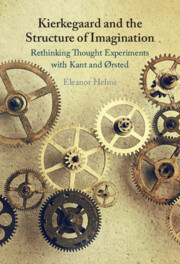Book contents
- Kierkegaard and the Structure of Imagination
- Kierkegaard and the Structure of Imagination
- Copyright page
- Contents
- Acknowledgments
- Abbreviations
- Introduction
- Part I The Origins of “Thought Experiment” in Kant and Ørsted
- Chapter 1 Thought Experiments as Tools of Cognition
- Chapter 2 How Thought Experiments Work
- Chapter 3 Ørsted, Mach, and the History of Thought Experiment
- Chapter 4 Empiricism and Kantian Accounts of Thought Experiment
- Chapter 5 Rationalism and the Question of Intellectual Intuition
- Part II A Kantian Account of Thought Experiment
- Part III Kierkegaard and the Concept of Thought Experiment
- Conclusion
- Bibliography
- Index
Chapter 4 - Empiricism and Kantian Accounts of Thought Experiment
from Part I - The Origins of “Thought Experiment” in Kant and Ørsted
Published online by Cambridge University Press: 26 September 2025
- Kierkegaard and the Structure of Imagination
- Kierkegaard and the Structure of Imagination
- Copyright page
- Contents
- Acknowledgments
- Abbreviations
- Introduction
- Part I The Origins of “Thought Experiment” in Kant and Ørsted
- Chapter 1 Thought Experiments as Tools of Cognition
- Chapter 2 How Thought Experiments Work
- Chapter 3 Ørsted, Mach, and the History of Thought Experiment
- Chapter 4 Empiricism and Kantian Accounts of Thought Experiment
- Chapter 5 Rationalism and the Question of Intellectual Intuition
- Part II A Kantian Account of Thought Experiment
- Part III Kierkegaard and the Concept of Thought Experiment
- Conclusion
- Bibliography
- Index
Summary
In philosophy of science, Mach’s account of thought experiments is more often described as relevant for contemporary usage than Ørsted’s. In this chapter, I survey recent Kantian accounts of thought experiment, arguing that the leading views inspired by Kant in philosophy of science remain broadly empiricist. This tendency may be due to their focus primarily on the role of thought experiments in the sciences. In later chapters, I will argue – against recent Kantian views – that Kant understood cognition more broadly to include not only sensory perception but also mathematical construction. Acknowledging that cognition does not always require empirical fulfillment opens new ways of understanding how thought experiments work in philosophy, which may rightly differ from their use in the sciences.
Information
- Type
- Chapter
- Information
- Kierkegaard and the Structure of ImaginationRethinking Thought Experiments with Kant and Ørsted, pp. 63 - 75Publisher: Cambridge University PressPrint publication year: 2025
Accessibility standard: Inaccessible, or known limited accessibility
Why this information is here
This section outlines the accessibility features of this content - including support for screen readers, full keyboard navigation and high-contrast display options. This may not be relevant for you.Accessibility Information
Content Navigation
Allows you to navigate directly to chapters, sections, or non‐text items through a linked table of contents, reducing the need for extensive scrolling.
Provides an interactive index, letting you go straight to where a term or subject appears in the text without manual searching.
Reading Order & Textual Equivalents
You will encounter all content (including footnotes, captions, etc.) in a clear, sequential flow, making it easier to follow with assistive tools like screen readers.
You get more than just short alt text: you have comprehensive text equivalents, transcripts, captions, or audio descriptions for substantial non‐text content, which is especially helpful for complex visuals or multimedia.
Visual Accessibility
You will still understand key ideas or prompts without relying solely on colour, which is especially helpful if you have colour vision deficiencies.
You benefit from high‐contrast text, which improves legibility if you have low vision or if you are reading in less‐than‐ideal lighting conditions.
